'Time for change': Encouraging working class actors to rise again
- Published
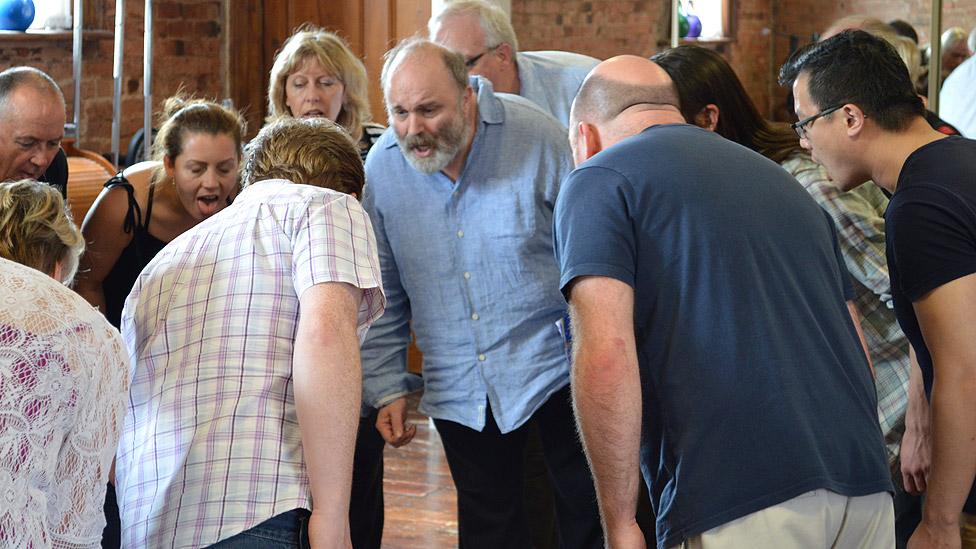
Jim Cartwright (centre) leading an exercise with one of his drama groups
From Dame Julie Walters to David Morrissey, many top showbusiness names have voiced concerns about a lack of working class actors. Now leading playwright Jim Cartwright is doing something to fix the problem.
There is a "quiet revolution" taking place in acting, Cartwright says. And it is happening in a fitness studio above a charity shop on Chorley High Street in Lancashire.
This is where Cartwright, whose plays include The Rise and Fall of Little Voice and Road, holds three drama classes every Sunday. On Saturdays, he takes over a room in a Methodist church in Manchester.
He started the classes in 2015 after reading comments from Dame Julie, external, who said she would not be able to afford to become an actress if she was starting out again.
"It made me really cross because I'm from a working class background," he says.

L to R: Tom Hiddleston (Eton), Eddie Redmayne (Eton), Benedict Cumberbatch (Harrow)
Reading articles about shrinking opportunities made him "like a bull with a sore head", he says. So his wife told him: "Don't get angry. Do something."
He took her advice and set up the drama studio with the aim of bringing through more working class talent, advertising his services in his local fish and chip shop.
"I got a little card saying 'drama studio' and stuck it on a chippy wall. And I waited. And they came, and they came, and they keep coming."
Two years later, he has five classes in the two locations and has set up a talent agency to represent the budding stars. There is also a youth group.
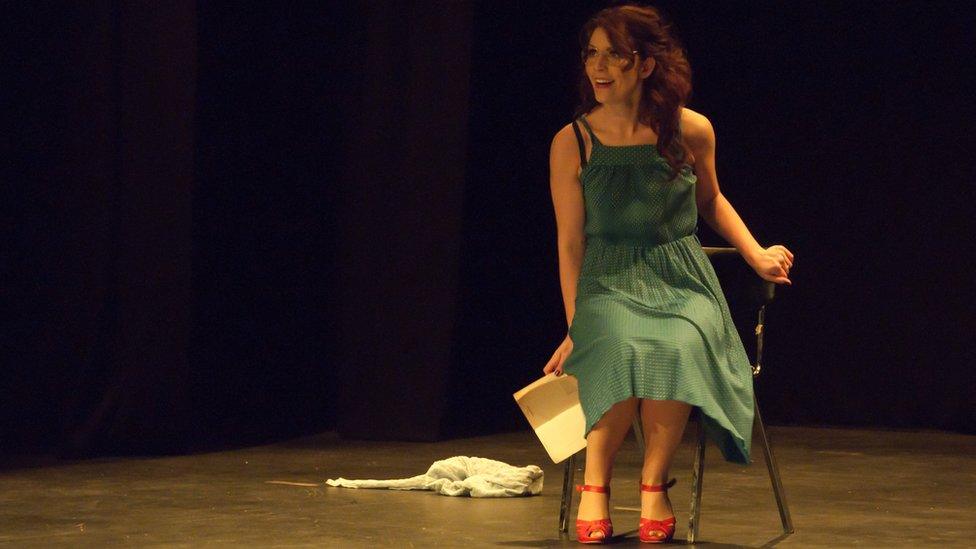
Jolene Rathmill has found it hard to progress in the acting profession
The adult class members range from people who have never set foot on stage to jobbing actors who are honing their skills. There are students, retired people, a few teachers, a former policeman, a fireplace salesman.
Jolene Rathmill, 38, from Oldham, works for financial advisers and runs confidence and self-esteem workshops in schools.
She says: "When I first started, Jim got me an agent and wrote something about me, saying he's worked with some of the top actresses in the world and that I have the potential to be that. He sees that in me. That's my ambition, 100%."
However, she thinks she is at a disadvantage because she hasn't been to a prestigious drama school.
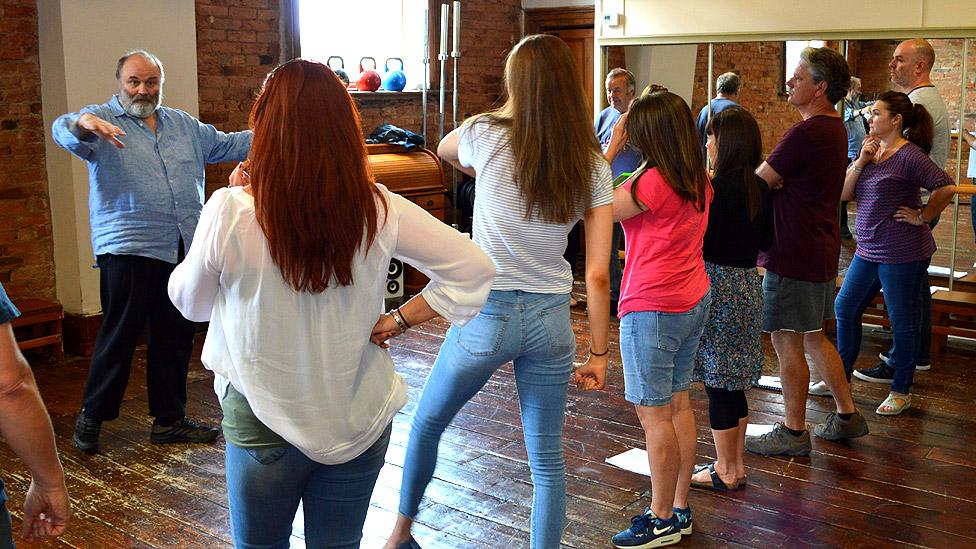
Cartwright's groups are rehearsing for their next showcase in Manchester
"I grew up on a council estate. We had chicken wire between our gardens and a tyre swinging in our back garden," she says.
"I feel that having not attended a professional, recognised drama school, initially you're right at the bottom of the hierarchy. There's a hierarchy of agents, and the top agents get the top castings, and further down the line if they want a real working class actor they might call people in.
"But it's very rare, so you're climbing, climbing, climbing" - she mimes climbing a ladder - "trying to get there. And it just doesn't happen."
Cartwright's efforts come as privately educated actors like Eddie Redmayne, Benedict Cumberbatch, Tom Hiddleston and Damian Lewis seem to have taken over the TV, film and theatre landscape.
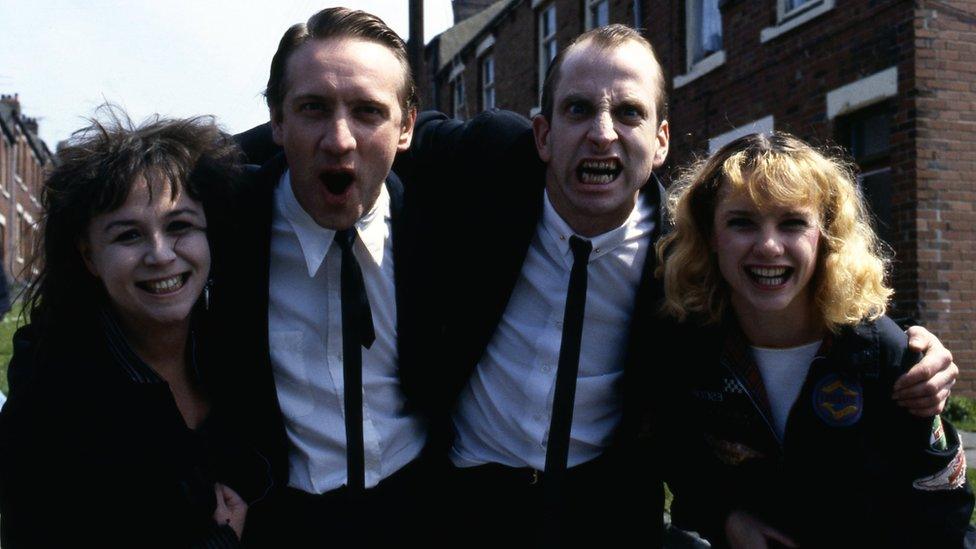
Cartwright made his name writing Road, which was filmed for the BBC in 1987
Last year, The Sutton Trust found, external that 42% of the winners in three main Bafta award categories had gone to people from private schools, while Sky News recently calculated that 45% of the BBC's best-paid stars, external were also privately educated.
Also in 2016, researchers found that, external 16% of actors came from working class backgrounds - half the level of the population as a whole - and that the British acting profession was "heavily skewed towards the privileged."
The Labour Party is now conducting its own investigation, external into opportunities for working class actors, with a report due to be published soon.
Cartwright has turned drama teacher after more than 30 years as one of the most vital voices in British theatre, external. His debut play Road is currently back at the Royal Court, external in London, where it launched his career in 1986.
He has also acted in TV shows like The Village, From Darkness and Coronation Street.
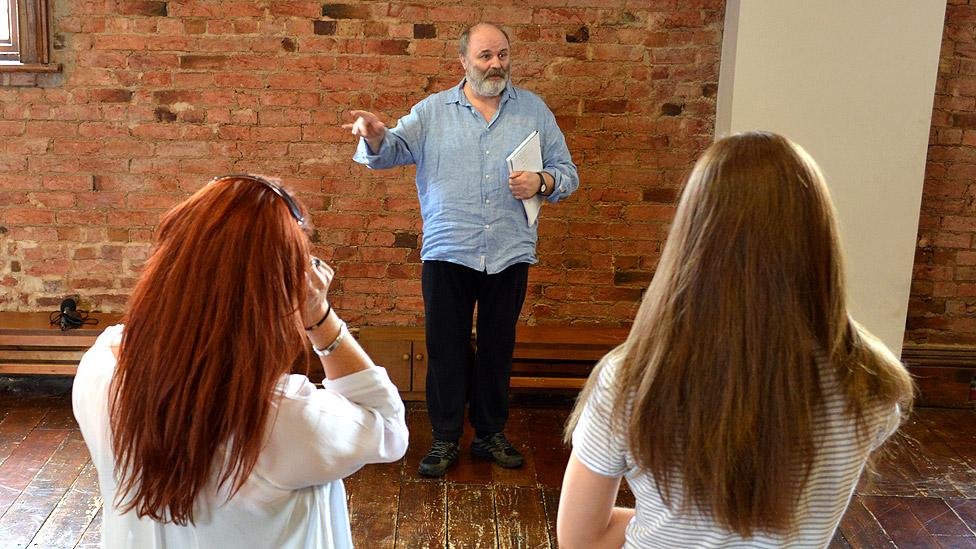
Cartwright is an acclaimed writer, actor, director - and now drama teacher
With the Cartwright Drama Studio, he hopes to replicate the "explosion of energy and talent" that came with the Kitchen Sink movement, external of the 1950s. That was fading by the 1980s, he says, when he noticed "the floppy fringe coming back".
He says: "I'd never say it's been an even playing field, but when I started out it was more even. But I've seen it change. I've seen it tilt."
His students come from all sections of society. Some would identify as working class, some wouldn't. But he believes the mindset is what sets his studio apart.
'We're a quiet revolution - and we're coming'
"The working class thing is an attitude. It's a burning, it's a feeling inside," Cartwright says. "That's what came in the '50s. It wasn't just that they were from a particular area or a particular economic strata.
"They carried with them a certain fire. That's what we're building in the classes. We're not just classes - we're a bit of a movement really and we're a quiet revolution.
"And we're coming. If you won't let us through the doors, we're coming over the walls and through the stalls. We're coming in. It's time. And anyone out there who feels the same as I do, join us, because it's time for change in theatre. It really is time for change.
"Not that there's not great work that goes on. There's fantastic work and fantastic people working in this business. But something's died that we're reviving."
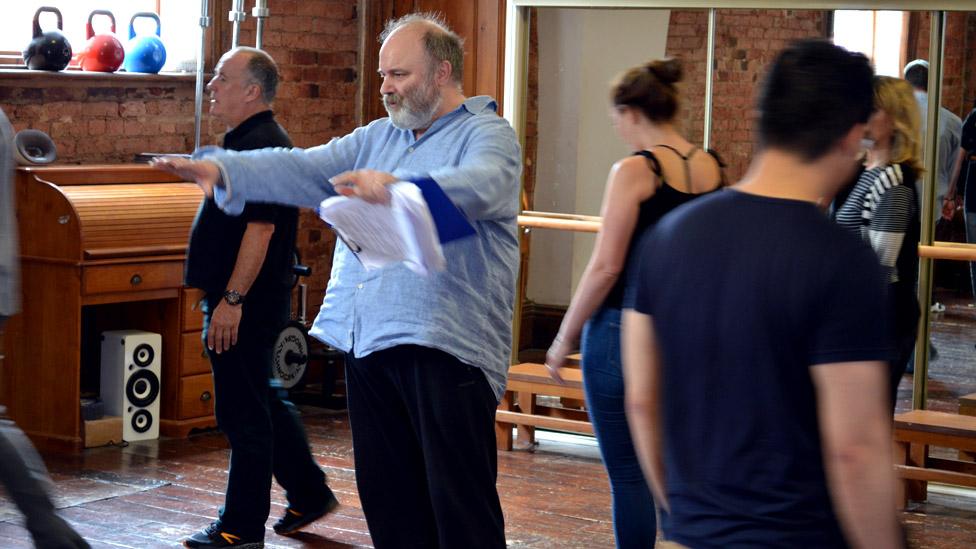
Cartwright brings casting directors and agents to see his students perform at regular showcases. Some have won small film and TV roles and are working on their own theatre shows and short films. There are no stars yet - but he is sure some have the talent to go all the way.
"Some of the people who come to these classes are just amazing, and it's criminal that they're not working in the highest levels of this industry," he says.
The class members include Darren Scott, 55, who worked as an actor for seven years before the work dried up. So he has spent the past 20 years as a primary school teacher. For him, attending the Cartwright Drama Studio has rekindled his performing career.
"I was in the very first showcase that Jim directed, and through that I got an agent, and I had an audition with Mike Leigh for his new feature film. And after three recalls, I was lucky enough to be offered a part. That's a direct result of coming here and working with Jim."
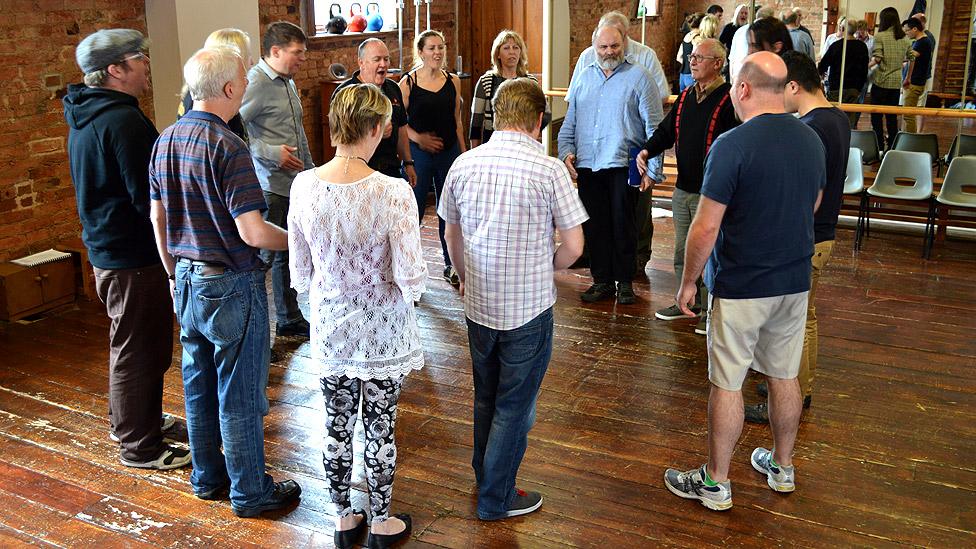
At the age of 19, Emma Heyes has studied acting at college and is attending the classes in preparation for auditioning for drama school. In the meantime, she's working on the checkouts at Tesco.
She has already had enough acting experience to know her accent puts her at a disadvantage.
"I have to learn accents, otherwise I won't get work," she explains. "I think I've only ever done one play where I've used my actual accent, and I've done a lot of plays.
"I've been into the top drama schools in the UK and they look at you as the novelty northerner in the corner."
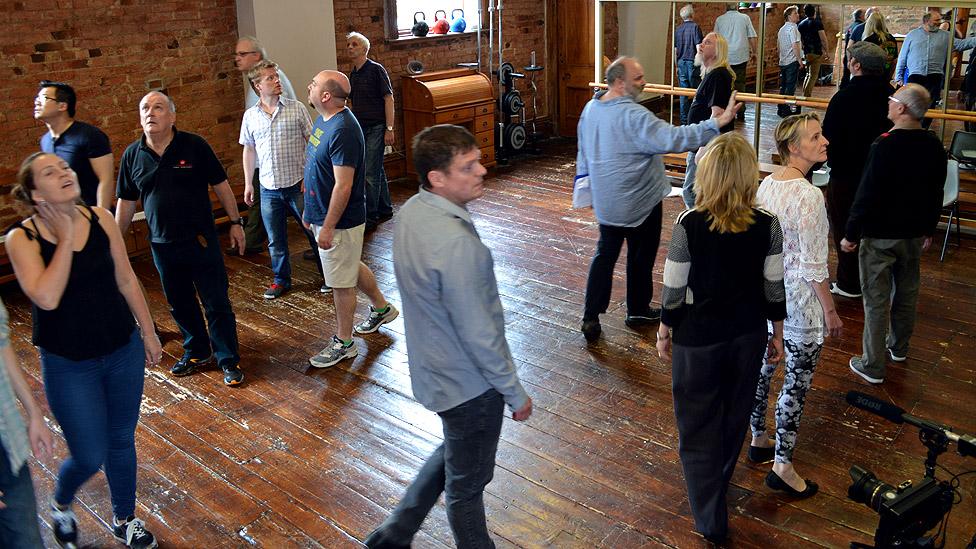
As part of the training, Cartwright tasks the group members with writing and performing monologues. He recommends one by 38-year-old Scott Brerton.
Brerton reads it and it is a bittersweet tale of trying to remember what happened on a big night out. It is exactly the sharp, funny, full-of-life voice that Cartwright is trying to encourage.
Brerton had not acted before he started coming to the classes six months ago. He has now been for his first audition and won his first role, performing in a three-night play in Liverpool last month.
"I don't think I would have been able to do it or have had the confidence to do it without coming here and having that weekly inspiration and driving motivation by Jim," he says.
It is early days for all concerned, and the "quiet revolution" may end with a whimper or a roar.
At any rate, Cartwright is on a mission to make it happen. In fact. he's throwing the kitchen sink at it.
The next Cartwright Drama Studio showcase is at the Palace Theatre, Manchester, on 31 July. Road runs at the Royal Court in London until 9 September.

Follow us on Facebook, external, on Twitter @BBCNewsEnts, external, or on Instagram at bbcnewsents, external. If you have a story suggestion email entertainment.news@bbc.co.uk, external.
- Published24 February 2016

- Published28 January 2016

- Published19 January 2015

- Published17 September 2014

- Published16 September 2014
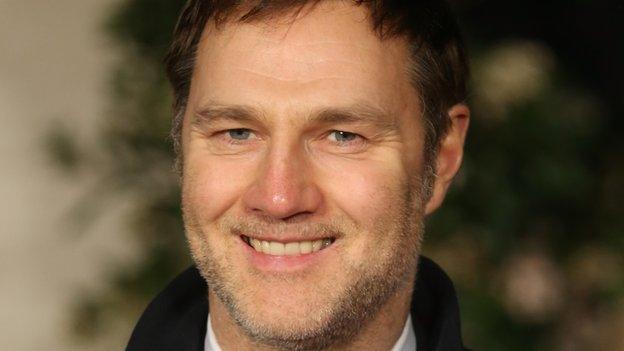
- Published12 June 2014
